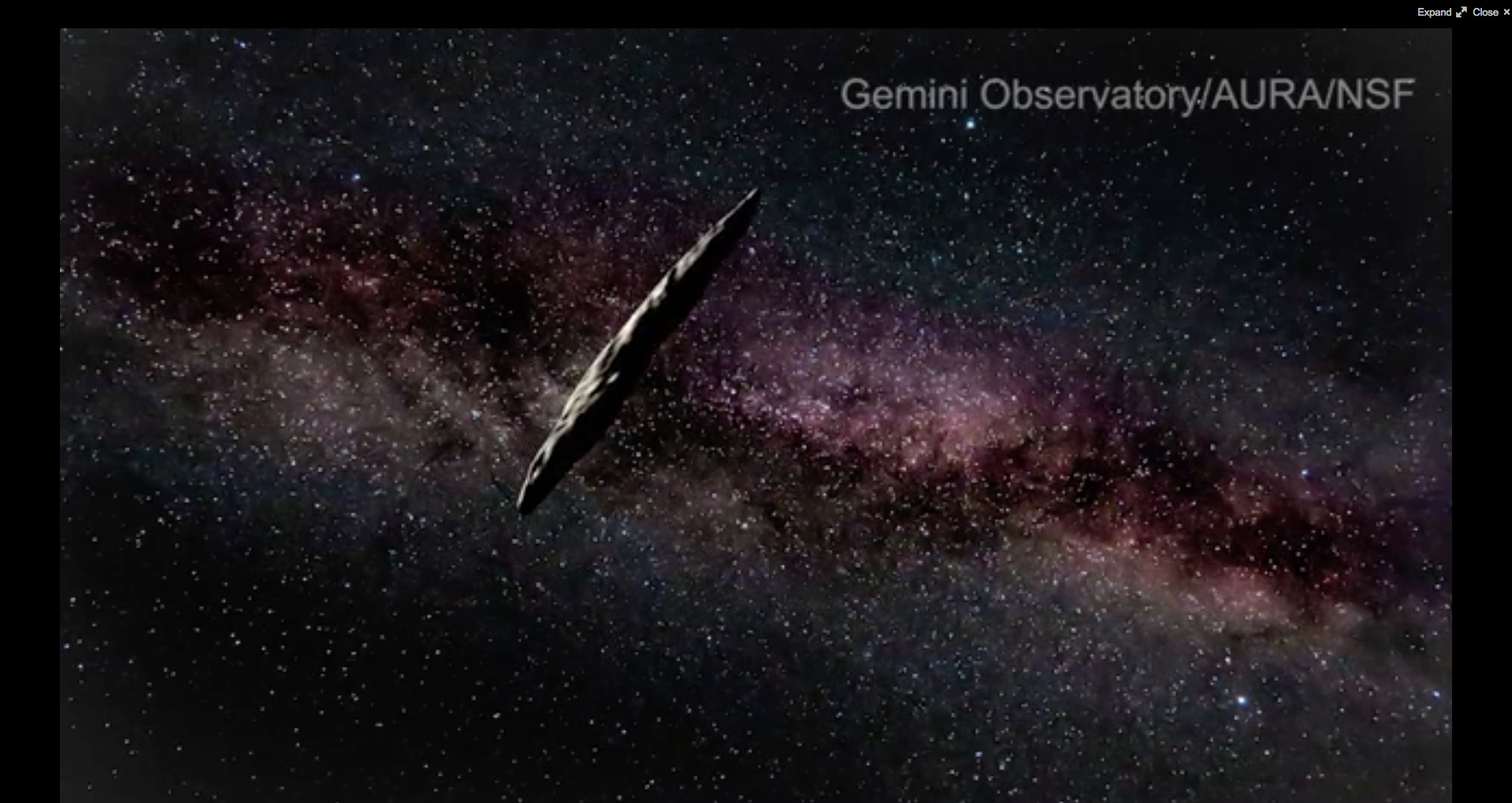Scientists spot the first interstellar space rock and wonder if aliens made it


A free daily email with the biggest news stories of the day – and the best features from TheWeek.com
You are now subscribed
Your newsletter sign-up was successful
A bizarre, fast-moving rock with the "proportions of a giant cucumber" has entered our solar system, becoming the first stony object of its sort ever observed zipping through the Milky Way, The Washington Post writes. As if the interstellar passerby wasn't exciting enough, extraterrestrial researchers are gearing up for what could be the observation of a lifetime — proof that intelligent life exists beyond our own little corner of the universe.
"The possibility that this object is, in fact, an artificial object — that it is a spaceship, essentially — is a remote possibility," explained the director of the Berkeley Search for Extraterrestrial Intelligence Research Center, Andrew Siemion.
Researchers have named the rock 'Oumuamua, the Hawaiian word for "messenger." 'Oumuamua's strange "behavior" is what has some researches thinking it could be more than just an ordinary quarter-mile-long cosmic pebble:
The Week
Escape your echo chamber. Get the facts behind the news, plus analysis from multiple perspectives.

Sign up for The Week's Free Newsletters
From our morning news briefing to a weekly Good News Newsletter, get the best of The Week delivered directly to your inbox.
From our morning news briefing to a weekly Good News Newsletter, get the best of The Week delivered directly to your inbox.
Planets and asteroids circle the sun on the same plane, like water swirling around a basin. 'Oumuamua dipped into the solar system from outside the plane, as if leaked from a cosmic faucet.It is shaped strangely, too. Most asteroids of this size are spherical. This object has the proportions of a giant cucumber. In fact, Harvard University astronomer Avi Loeb recently told [Russian billionaire Yuri Milner] that 'Oumuamua has the optimal design of a vessel meant to travel through space, The Atlantic reported. [The Washington Post]
To get ready for the event, scientists announced that they will be pointing highly sophisticated radio telescopes at the space rock to pick up if it is using technology to reach its speeds of up to 196,000 miles per hour. The devices are so sophisticated, in fact, that "if an electronic device no more powerful than a WiFi router or telephone handset is transmitting on 'Oumuamua, the telescope will be able to sense it," the Post writes. Read more about the 'Oumuamua visitation here. Jeva Lange
Editor's note: This post originally mischaracterized the location of the space rock. It has since been corrected. We regret the error.
A free daily email with the biggest news stories of the day – and the best features from TheWeek.com
Jeva Lange was the executive editor at TheWeek.com. She formerly served as The Week's deputy editor and culture critic. She is also a contributor to Screen Slate, and her writing has appeared in The New York Daily News, The Awl, Vice, and Gothamist, among other publications. Jeva lives in New York City. Follow her on Twitter.
-
 How the FCC’s ‘equal time’ rule works
How the FCC’s ‘equal time’ rule worksIn the Spotlight The law is at the heart of the Colbert-CBS conflict
-
 What is the endgame in the DHS shutdown?
What is the endgame in the DHS shutdown?Today’s Big Question Democrats want to rein in ICE’s immigration crackdown
-
 ‘Poor time management isn’t just an inconvenience’
‘Poor time management isn’t just an inconvenience’Instant Opinion Opinion, comment and editorials of the day
-
 Blue Origin launches Mars probes in NASA debut
Blue Origin launches Mars probes in NASA debutSpeed Read The New Glenn rocket is carrying small twin spacecraft toward Mars as part of NASA’s Escapade mission
-
 Dinosaurs were thriving before asteroid, study finds
Dinosaurs were thriving before asteroid, study findsSpeed Read The dinosaurs would not have gone extinct if not for the asteroid
-
 SpaceX breaks Starship losing streak in 10th test
SpaceX breaks Starship losing streak in 10th testspeed read The Starship rocket's test flight was largely successful, deploying eight dummy satellites during its hour in space
-
 Rabbits with 'horns' sighted across Colorado
Rabbits with 'horns' sighted across Coloradospeed read These creatures are infected with the 'mostly harmless' Shope papilloma virus
-
 Lithium shows promise in Alzheimer's study
Lithium shows promise in Alzheimer's studySpeed Read Potential new treatments could use small amounts of the common metal
-
 Scientists discover cause of massive sea star die-off
Scientists discover cause of massive sea star die-offSpeed Read A bacteria related to cholera has been found responsible for the deaths of more than 5 billion sea stars
-
 'Thriving' ecosystem found 30,000 feet undersea
'Thriving' ecosystem found 30,000 feet underseaSpeed Read Researchers discovered communities of creatures living in frigid, pitch-black waters under high pressure
-
 New York plans first nuclear plant in 36 years
New York plans first nuclear plant in 36 yearsSpeed Read The plant, to be constructed somewhere in upstate New York, will produce enough energy to power a million homes
